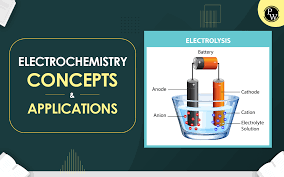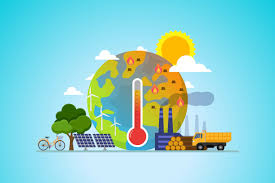
Electrochemistry Concepts – HNK Globals
Description:
Electrochemistry is the study of chemical reactions that involve the transfer of electrons between substances. It plays a crucial role in various fields, including energy production, corrosion, and biological systems. By understanding electrochemical processes, we can better understand how batteries work, how corrosion occurs, and how chemical energy is transformed into electrical energy. This branch of chemistry explores the relationship between electricity and chemical reactions, which has profound implications in everyday life, from powering electronic devices to enabling sustainable energy solutions.
Key Electrochemistry Concepts:
Redox Reactions
- Redox (reduction-oxidation) reactions are fundamental to electrochemistry. In these reactions, one substance gains electrons (reduction), and another loses electrons (oxidation).
- Example: In a galvanic cell, zinc undergoes oxidation, and copper undergoes reduction.
Electrochemical Cells
- Galvanic Cells (Voltaic Cells): These cells convert chemical energy into electrical energy through spontaneous redox reactions. Common examples include batteries like the Daniell cell.
- Electrolytic Cells: These cells use electrical energy to drive non-spontaneous reactions, such as in electroplating or the extraction of metals.
Electrode Potentials
- Electrode potentials are the voltages associated with individual electrodes in electrochemical cells. They help predict the direction of electron flow and the feasibility of reactions.
- The Standard Electrode Potential (E°) is a key value for determining the relative tendency of elements to gain or lose electrons.
Nernst Equation
- The Nernst equation relates the electrode potential to the concentration of ions in solution. It allows for the calculation of cell potentials under non-standard conditions and is crucial for understanding real-world electrochemical reactions.
Faraday’s Laws of Electrolysis
- These laws quantify the relationship between the amount of substance produced or consumed in an electrolytic reaction and the amount of electric charge passed through the electrolyte.
- Faraday’s First Law states that the mass of a substance altered during electrolysis is directly proportional to the amount of electric charge passed through the system.
Electrolytes and Conductivity
- Electrolytes are substances that dissociate into ions when dissolved in water, allowing the conduction of electricity. Understanding how electrolyte concentration affects conductivity is crucial for applications like batteries, fuel cells, and corrosion prevention.
Applications of Electrochemistry:
Batteries and Fuel Cells
- Electrochemistry is the foundation of energy storage systems like batteries (e.g., lithium-ion) and fuel cells. These devices store chemical energy and convert it into electrical energy when needed, powering everything from mobile phones to electric vehicles.
Corrosion Prevention
- Electrochemical processes explain how metals corrode when exposed to air and moisture. Understanding the principles of electrochemistry helps in developing methods to prevent corrosion, such as galvanization or cathodic protection.
Electroplating and Electrorefining
- Electroplating involves depositing a thin layer of metal onto an object through an electrolytic process. This technique is used to create shiny finishes or protect materials from wear and corrosion.
- Electrorefining is used to purify metals like copper, improving their quality for industrial use.
Biological Systems
- Electrochemistry is also central to biological processes. For example, electrochemical gradients across cell membranes are vital for nerve impulses and muscle contractions. Understanding these processes is crucial in medical research and bioengineering.
Energy Conversion and Sustainability
- Electrochemical processes are pivotal in renewable energy technologies, such as solar energy storage and hydrogen fuel cells, helping drive sustainable energy solutions and reduce dependence on fossil fuels.
Why Choose HNK Globals for Electrochemistry Education?
In-Depth Learning Resources
HNK Globals provides comprehensive courses on electrochemistry that cover everything from basic principles to advanced concepts and applications. Our courses are designed to make complex topics understandable and accessible.Interactive Simulations
Engage with electrochemical concepts through hands-on simulations that allow you to visualize and experiment with reactions, cell potentials, and more. This interactive approach enhances the learning experience.Expert-Led Courses
Learn from industry experts and experienced educators who bring real-world applications of electrochemistry into the classroom, providing insights that bridge theory and practice.Practical Applications
At HNK Globals, we focus on the practical applications of electrochemistry, helping students and professionals alike understand how this field impacts industries ranging from energy to medicine and beyond.Global Learning Community
Join a global network of learners and professionals who are passionate about electrochemistry and chemistry. Share knowledge, ask questions, and connect with others who are shaping the future of science.
Start your journey into electrochemistry today with HNK Globals and unlock the potential of chemical reactions in real-world applications!








